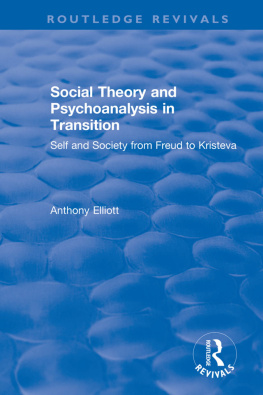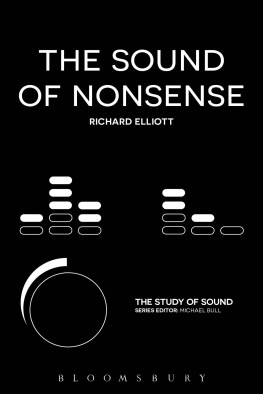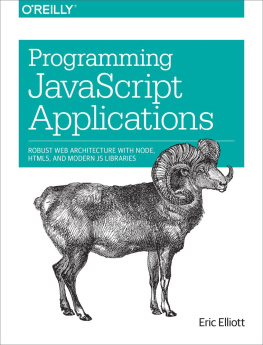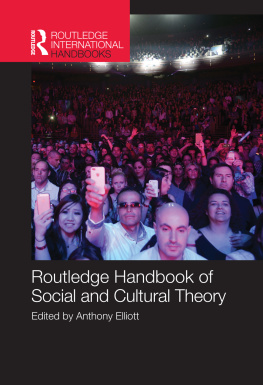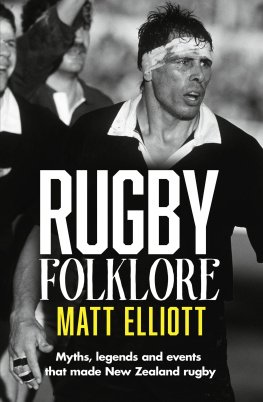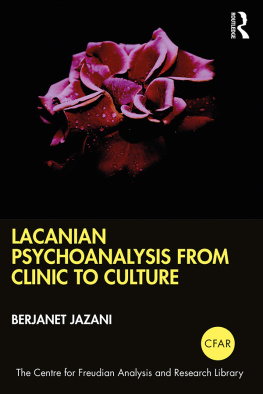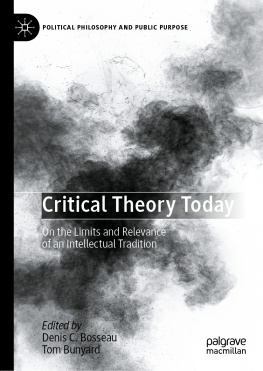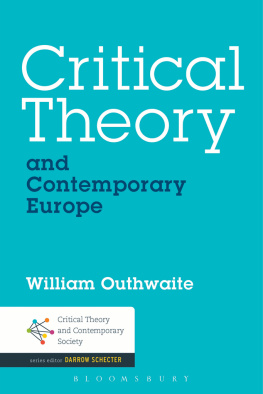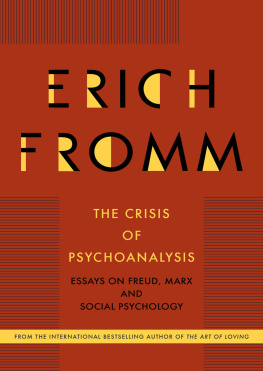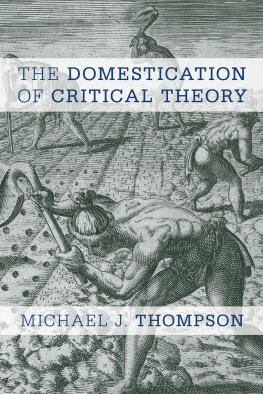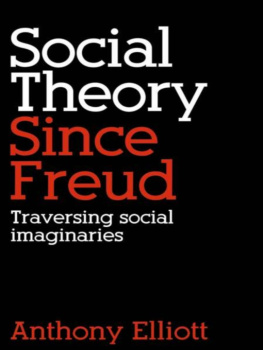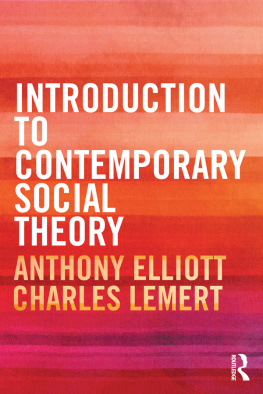Routledge Revivals
Social Theory and Psychoanalysis in Transition
Originally published in 1999 Social Theory and Psychoanalysis in Transition is a benchmark critique of Freudian theory in which a dialogue between the Frankfurt School, the Lacanian tradition and post-Lacanian developments in critical and feminist theory is developed. Considering afresh the relations between self and society, Elliot argues for the importance of imagination and the unconscious in understanding issues about the self and self-identity, ideology and power, sexual difference and gender.
Social Theory and Psychoanalysis in Transition
Self and Society from Freud to Kristeva
By Anthony Elliott
First published in 1999
by Free Association Books Limited
This edition first published in 2018 by Routledge
2 Park Square, Milton Park, Abingdon, Oxon, OX14 4RN
and by Routledge
711 Third Avenue, New York, NY 10017
Routledge is an imprint of the Taylor & Francis Group, an informa business
1999 Anthony Elliott
All rights reserved. No part of this book may be reprinted or reproduced or utilised in any form or by any electronic, mechanical, or other means, now known or hereafter invented, including photocopying and recording, or in any information storage or retrieval system, without permission in writing from the publishers.
Publisher's Note
The publisher has gone to great lengths to ensure the quality of this reprint but points out that some imperfections in the original copies may be apparent.
Disclaimer
The publisher has made every effort to trace copyright holders and welcomes correspondence from those they have been unable to contact.
A Library of Congress record exists under LCCN: 00363620
ISBN 13: 978-1-138-38871-0 (hbk)
ISBN 13: 978-0-429-42438-0 (ebk)
ISBN 13: 978-1-138-38875-8 (pbk)
SOCIAL THEORY AND PSYCHOANALYSIS IN TRANSITION
SOCIAL THEORY AND PSYCHOANALYSIS IN TRANSITION
Self and Society from Freud to Kristeva
Anthony Elliott
This edition published in Great Britain in 1999 by
Free Association Books Limited
57 Warren Street, London W1P 5PA
Anthony Elliott, 1999
The right of Anthony Elliott to be identified as the author of this work has been asserted by him in accordance with the Copyright, Designs and Patents Act 1988.
ISBN 1 85343 445 0 (hbk); 1 85343 446 9 (pbk)
A CIP catalogue record for this book is available from the British Library
Produced for Free Association Books Ltd by
Chase Production Services, Chadlington, OX7 3LN
Contents
1 Subjectivity and the Discourse of Psychoanalysis
Freud and Social Theory
2 The Manipulation of Desire
Critical Theory and the Problem of Fragmentation
3 Repression and Social Transformation
Critical Theory Beyond the Politics of Domination
4 The Language of Desire
Lacan and the Specular Structure of the Self
5 Psychoanalysis, Ideology and Modern Societies
Post-Lacanian Social Theory
6 Sexual Division, Gender-Identity and Symbolic Order
Feminist Politics and Post-Lacanian Theory
7 Social Theory and Psychoanalysis in Transition
The Possibilities of the Social Imaginary
During the preparation of both editions of this book, numerous readers of the manuscript offered critical comments on particular chapters, and I have endeavoured to incorporate their suggestions wherever possible. I am especially grateful to Anthony Giddens and John Thompson, both of whom helped to shape the concerns of this book, and have always advised me well. Particular thanks are due to David Stonestreet at Free Association Books, for all the help he has given me in preparing this edition. It is now also a pleasure to acknowledge one of the first edition reviewers, Jeffrey Prager at UCLA, whose report served as a significant influence on the book. My greatest debt is to Nicola Geraghty. In helping to prepare this edition for publication, she devoted considerable time to the project, and made many important contributions. I am immensely grateful for her help and support.
Anthony Elliott
December 1998
University of Melbourne
For Nicola
When I began writing Social Theory and Psychoanalysis in Transition in the late 1980s, the question of human subjectivity and of self-identity had reappeared as a fundamental issue in social theory in particular, as well as the social sciences more widely conceived. By the time the book was published in the early 1990s, psychoanalytic theory had become an increasingly important and fruitful resource for the analysis of the self, self-identity and subjectivity in critical social theory. Lacan's Freud was, and in many disciplinary approaches remains, the dominant psychoanalytic discourse for understanding the constitution of the subject in the analysis of social and cultural processes. Yet the critique initially sketched in Social Theory and Psychoanalysis in Transition sought not only to demonstrate that the relation between society and the psyche was considerably more complex and creative than was generally recognized in Lacanian-orientated social theory, but also to examine other theoretical attempts to understand the interweaving of our psychic and socio-historical worlds.
The critiques of the relations between self and society which I analyse in this book are developed from three key standpoints. These are (1) critical theory, with its emphasis on the importance of psychoanalysis, political theory and philosophy for emancipatory thought; (2) post-structuralist interrogations of the production of subjectivity and identity; and (3) various feminist readings of psychoanalysis and of masculinist assumptions in Western social theory. In considering these standpoints, I put forward the argument that Freud and psychoanalysis are of considerable importance for charting both intimate, psychic processes and social-historical developments in the present age. I try to demonstrate the multiplex ways in which these standpoints allow us to grasp the complex, contradictory forms in which culture impacts on the process of self-formation, including the production of novel structures of cognitive and emotional coercion with new forms of social regulation. Against the backcloth of the critique that I develop, the elements of a more constructive account of the relations between self and society are offered. For in suggesting that various versions of social theory have falsely downgraded the personal and political impact of the unconscious in social relations, my primary concern is to trace Freud's arguments concerning the creative uses that the mind makes of fantasies and identifications, to link such internal fabrications to the making and remaking of society and culture, and hopefully to contribute to a broader dialogue between social theory and psychoanalysis.
It is my view that the social conditions in which we now live - in which forces of globalization, privatization and postmodernization increasingly impact upon our lives and our relations with others render the task of developing a sophisticated theory of the human subject politically urgent. It is especially from this angle that the import of Freud and psychoanalysis for grasping the permeability between the self and the social world brooks large. The interdisciplinary project of social theory, infused by the conceptual insights and challenges of Freud and psychoanalysis, provides critical perspectives on the production of subjectivity and identity, on sexuality and gender, and on society, culture and technology. Today, this sort of interdisciplinary work is especially significant for grasping how subjectivity and identity are being reconstituted within a global context of economic uncertainty and ambivalence, in which the advent of new communication technologies and unpredictable political turbulence have produced novel forms of culture and social reproduction.

